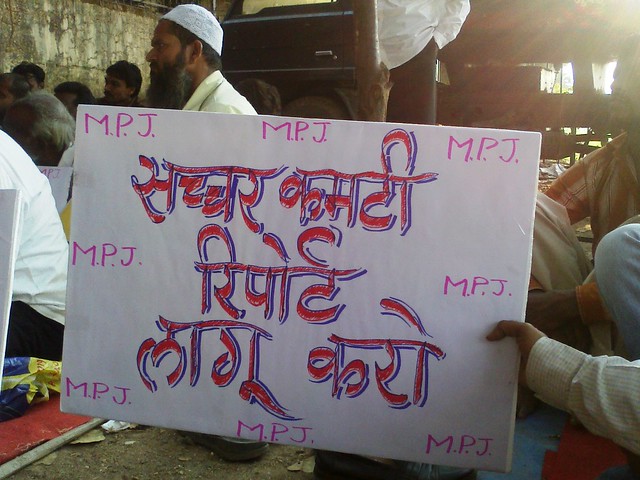By Dr. Md. Abdus Salam
Several commissions like the Gopal Singh Commission, the Ranganath Misra Commission and the Sachar Committee have examined the socio-economic conditions of Muslims and have come to the conclusion that the condition of Indian Muslims is as bad as that of people from other weaker sections. The sequence of setting up of various committees under congress regime can be observed as follows:
The High Power Panel under the chairmanship of Dr. Gopal Singh was set up by the Ministry of Home Affairs to enquire into the condition of Minorities, Scheduled Castes (SCs) and Scheduled Tribes (STs) and other weaker sections, on May 10, 1980 which had submitted its report on June 14, 1983. However, then the Government of India, in its wisdom did not think it proper to place it before the Parliament for a full scale national debate and proper action. The report was kept idle for a long time till the V.P. Singh government decided to release it. In that report the Dr. Gopal Singh Committee maintained that there was a “sense of discrimination prevailing among the minorities” and that it “must be eliminated, root and branch, if we want the minorities to form an effective part of the mainstream.”
On March 9, 2005, the Manmohan Singh government had issued the notification for constitution of the seven-member high-level committee headed by Justice Rajinder Sachar, for preparation of report on the Social, Economic and Educational Status of the Muslim Community of India. . The Committee submitted its report to the Government of India on November 17, 2006 which was placed before the parliament. The Sachar Committee concluded that in 12 states where the Muslim share in total population is 15.4 per cent; their representation in government jobs is only 5.7 per cent. In police, administrative and diplomatic services their representation varies from 1.6 to 3.4 per cent.

Activists of Movement for Peace and Justice [MPJ] demand for implementation of Sachar recommendations in Mumbai in Nov. 2011. [TCN Photo]
In the year 2004, Ministry of Social Justice and Empowerment, Government of India had issued a notification for the constitution of National Commission on Religious and Linguistic Minorities (NCRLM), under the chairmanship of (Retd.) Justice Rangnath Misra. The commission was meant to recommend reservation and other development-oriented measures for educational and economic development of this portion of the Indian citizens. The commission submitted its report on May 10, 2007. After a long gap it was made public in January 2010. The commission has given suggestion on many issues like education, job, administration and legislative system. Two recommendations are very important. Firstly, 15% posts in every Central and State Government department must be reserved for minorities — 10% would be for Muslims and 5% for other minorities. If Muslim candidates are not found for the above mentioned 10% posts, then those would be filled with candidate from other minority communities. By any means it must not be done with candidate from the majority part. Secondly, if it becomes a judicial deadlock with the situation which cannot be avoided, the recommendation is that among the total population of other backward classer 8.4% is minority. For that reason from the total 27% reservation for OBCs 8.4% seat must be kept aside for minorities. This 8.4% would be divided into two parts 6% for Muslims and 2.4% for other minorities.
Thus, the findings of government committees explicitly establish that Muslims are most socially, economically and educationally backward minority of the country and in various areas they have lagged behind even the Schedule Castes.
Therefore there is appropriate time for the secular parties of India to come forward with the concrete solution and raise the following issues:
1. Poverty, Unemployment, Health, Illiteracy, Child Malnutrition etc. are the common/almost uniform problems in almost all the section/community of the society.
2. We cannot progress /develop ignoring a significant Number of marginalized populations.
3. Our present political set up should not allow/permit any scheme specific for the upliftment of a particular section/society.
4. Therefore, formulate/evaluate/examine/ implement policies and programmes on the basis of the socio-economic criterion that shall benefit every section of the society of India.
5. There is a strong need to change our mind set and follow the policy of Nationality, Accountability, Productivity and Equity (NAPE).
—
Dr. Md. Abdus Salam is Associate Professor at Department of Economics, Aligarh Muslim University, Aligarh.

